
Wake Forest presented its 2019 Distinguished Alumni Awards on April 26 at a gala dinner honoring three alumni who have served the University and have woven Pro Humanitate through their lives and their work. They are selected by the Alumni Council.
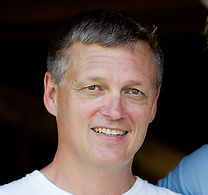
Buck Cochran (’82)
Greensboro, North Carolina
Buck Cochran remembers growing up in Troy, North Carolina, admiring the late devoted Demon Deacon Earle Connelly (’48), his father’s best friend and a city leader. “I wanted to be like him, to be that kind of man,” he says.
What kind of man has Cochran turned out to be? There’s the résumé of accomplishments: chemistry major with Wake Forest degree, naval flight officer and mission commander, FMC Corp. chemical salesman, graduate of Duke Divinity School, associate pastor at the 2,000-member Westminster Presbyterian Church in Greensboro and obedient servant to a divine nudge to leave his church job in 2007 — for what, he did not know. It turned out to be helping establish Peacehaven Community Farm in Whitsett, North Carolina.
Cochran is executive director of Peacehaven, a nonprofit whose mission is to connect people with intellectual and developmental disabilities to the larger community through shared living and the work of a sustainable farm. It regularly draws Wake Foresters (and residents from nearby cities) to volunteer and spend time working alongside adults with special needs. Cochran has watched the farm grow from its original 89 acres and with the completion of its home for adults with disabilities. He has watched relationships take root and the nonprofit thrive, guided by core values of compassion, sustainability and servant leadership. The Guilford Nonprofit Consortium named it nonprofit of the year in 2014.
“You should never underestimate people’s willingness and capacity to serve,” Cochran says. “It’s been that way since Day One. Sometimes I scratch my head and think ‘This is amazing.’ It’s this basic thing inside of us.”
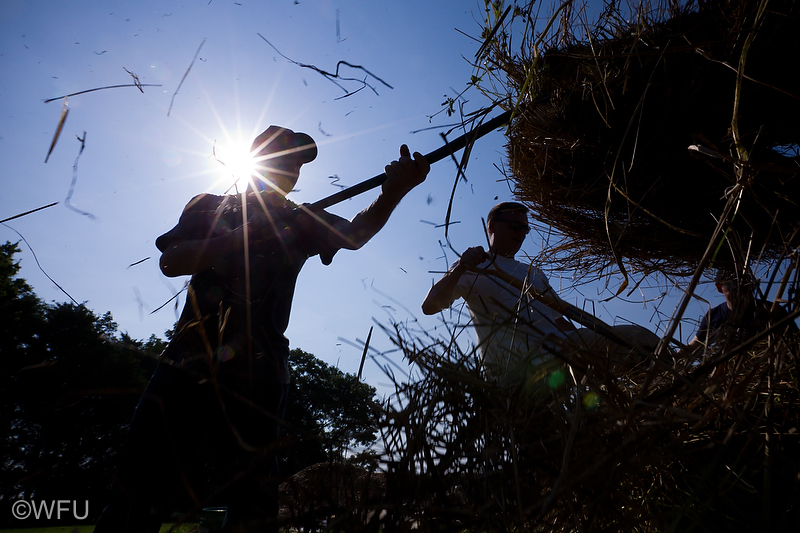
Peacehaven Community Farm in Whitsett, North Carolina
Beyond achievements, there’s the true measure of the man: wife to Cathy, father to a daughter, Cameron, and a son, Trey, whom he credits with starting him on the journey away from the corporate world. Trey was born with Asperger syndrome; predictions for his future independence at first were dire. Today, he is a college graduate with a job in Tennessee.
Buck Cochran is a man unafraid to tear up when he talks about his family or the joy he has found as an accidental farmer, in truth sowing community and love more than vegetables. He savors the simple things at the farm — sharing a meal or walking a lap with one of the residents. An admirer of humanitarian Jean Vanier, he quotes him: “We are not called by God to do extraordinary things, but to do ordinary things with extraordinary love.”
He gives his alma mater credit for imbuing in him the excitement for learning and fearlessness about trying new things, including farming. And of its motto, Pro Humanitate, he says, “I think it means deep intention and reflection about what I’m doing with my life, where I’m called to serve, how I share that hopefully in authentic ways with those around me so perhaps that philosophy spreads a little bit. This is going to sound a little hokey, but it really means everything to me. I think it’s why I’m on this planet.”
— Maria Henson (’82)
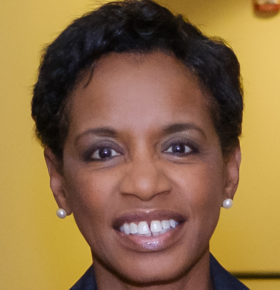
Donna F. Edwards (’80)
Oxon Hill, Maryland
Former U.S. Rep. Donna Edwards, D-Md., grew up in an Air Force family that emphasized volunteering, but her dedication to public service took firm root as a preteen candy-striper in the late 1960s at Clark Air Base in the Philippines.
Troops injured in the Vietnam War — and the bodies of those killed — made their first stop at Clark. Edwards remembers riding a bus past hangars filled with flag-draped caskets to volunteer at the hospital. There, “in my little pink-and-white uniform and little cap,” she delivered mail and read to service members, some bandaged and unable to see. “It was so powerful. … I can feel it even now. … I was just doing one little thing that I liked to do, which was open a book and read, but it made a difference.”
Edwards has made a difference throughout her life, and she says Wake Forest, where she is a trustee, reinforced that principle. She became the first African-American woman to represent Maryland in Congress, after a special election in June 2008. She won four full terms, leaving in 2017. Among her many legislative priorities were school meals, after-school programs in low-income areas, reducing opioid deaths and giving prisoners and former prisoners access to education.
Edwards, an English major, worked for Lockheed Corp. in NASA’s Spacelab program. Later, she became a private and public-interest lawyer, then ran several nonprofits.
An interest in reducing domestic violence began as a girl, hearing a neighbor’s abuse through paper-thin walls in military housing. Only years later did she realize that the neighbor’s glamorous makeup and Jackie Onassis sunglasses were hiding her bruises. As an adult, Edwards volunteered for a domestic violence hotline. She later co-founded and led the National Network to End Domestic Violence and spearheaded passage of the Violence Against Women Act in 1994.
Born in Yanceyville, North Carolina, Edwards fell in love with Wake Forest after turning down a U.S. Air Force Academy appointment because women weren’t allowed to fly jets. She was one of 12 black women in her first-year class, and she says she was not welcomed by her white roommate, but others embraced her and became lifelong friends. She still has their T-shirt for BABES (Bostwick A-side Basement Everlasting Sweethearts).
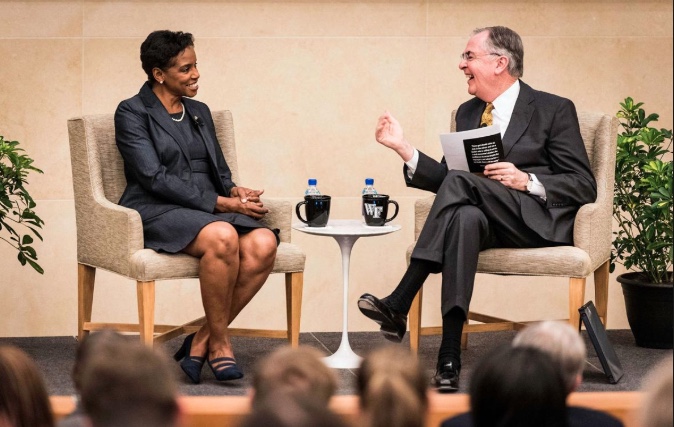
Donna Edwards ('80) with President Nathan O. Hatch
Wake Forest’s liberal arts curriculum helped her in big and small ways — from a comparative religion class that helped her understand the Mideast to study abroad in Salamanca, Spain, that fueled her interest in international politics.
After leaving Congress, she traveled in an RV to raise awareness of state and national parks and indulge her love of the outdoors. She’s based in Maryland but still tours in her RV for a book project on how her travels illuminated issues such as immigration and health care. She consults, speaks and writes a column for The Washington Post. Is politics in her future? She isn’t sure.
Her advice to students? Work hard, take advantage of every opportunity and accept the risk of failure. “I think you’re not prepared to live if you’re not prepared to fail.”
— Carol L. Hanner
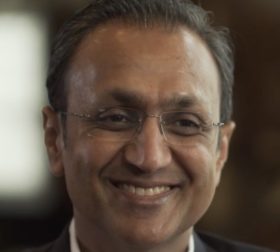
Anil Rai Gupta (MBA ’92, LL.D. ’17)
Delhi, India
Anil Rai Gupta grew up in India watching his father excel by doing things right — while doing what is right.
“My father was a born entrepreneur, and he really put a lot of effort, hard work into building his business completely out of scratch,” says Gupta, chairman and managing director of Havells India Limited, one of India’s largest electrical equipment companies.
“In fact, our first factory was in our home,” Gupta says. “We were assembling switches and sockets during those days, and I was a 3-year-old watching that in the house.”
The senior Gupta overcame poverty and ill health to build Havells into a powerhouse, as his son tells in his book, “Havells: The Untold Story of Qimat Rai Gupta” (2016).
Anil Gupta joined Havells in 1992 after earning his MBA at Wake Forest, where he received the Babcock Award for academics, integrity and leadership. At Havells, he led the acquisition of Europe’s Sylvania lighting, which was 1 ½ times the size of Havells and operated in more than 50 countries. Gupta transformed Sylvania despite the 2008 global recession and continued Havells’ growth after his father died in 2014. “We’ve grown from a $5 million company to a $5 billion company in the last 25 years,” he says.
Gupta also learned from his parents that caring about others is imperative. “I remember from my childhood days … a lot of talk on values,” Gupta says. Coming to Wake Forest was “a dream come true,” he says, and its openness to diverse cultures, team building and Pro Humanitate have guided his work and life.
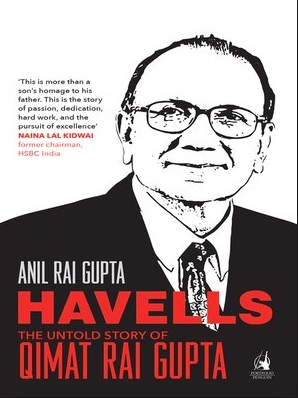
Anil Rai Gupta's book about his father's life
In 2005, Havells began offering students in Alwar district a midday meal to alleviate hunger. “Their tummies will be full, so they can concentrate on studies,” Gupta says. The project feeds more than 60,000 students a day and has built toilets for girls in more than 300 schools. The company has reduced its environmental impact, contributed to natural disaster relief and helped restore historical monuments to boost tourism and create urban jobs, among its many initiatives.
Gupta and his wife, Sangeeta, are proud of their two children. Their son is developing high-productivity hydroponics for rural farmers. Their daughter is focused on manufacturing reusable sanitary napkins because so many Indian women lack access.
Gupta, who received an honorary Doctor of Laws degree from the University in 2017, says Wake Forest and his father taught him that “doing good for the people, all the stakeholders, whether it’s the dealers, the employees, your lenders, your investors — if you are good to them, business growth will follow.”
— Carol L. Hanner


